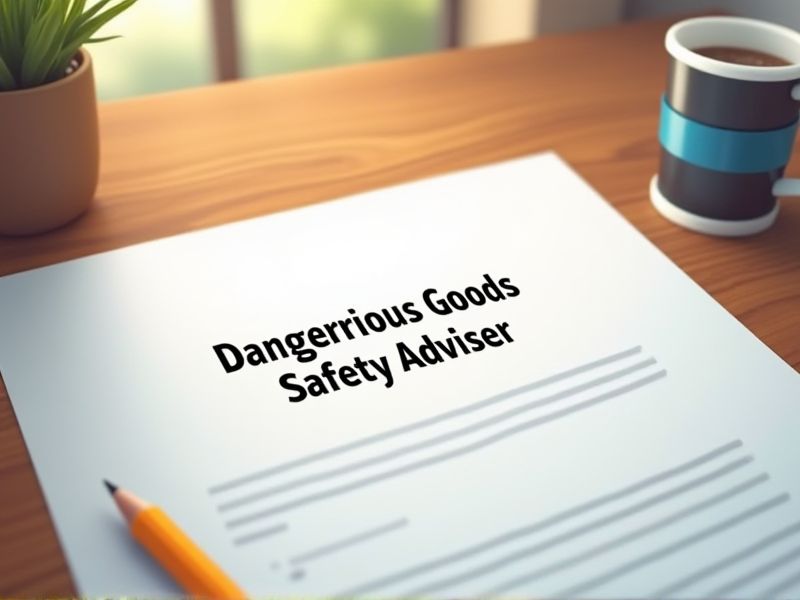
Handling dangerous goods involves significant risks, which necessitates stringent safety measures to prevent accidents. The role of a Dangerous Goods Safety Adviser (DGSA) is crucial in ensuring compliance with legal and safety regulations, requiring in-depth knowledge and expertise. Certifications provide verifiable evidence of a DGSA's competence in managing hazardous materials safely and effectively. Below are important certifications you may need as a Dangerous Goods Safety Adviser.
Dangerous Goods Safety Adviser (DGSA) Certification
The DGSA certification ensures that individuals have the requisite knowledge to handle and transport dangerous goods safely, minimizing the risk of accidents. It aligns companies with legal compliance, preventing costly legal repercussions and maintaining operational integrity. Certification contributes to enhanced public and environmental safety by ensuring that dangerous goods are managed under stringent standards. Structured guidance by certified professionals aids in the efficient implementation of safety measures throughout the supply chain.
IATA Dangerous Goods Regulations (DGR) Certification
Obtaining the IATA Dangerous Goods Regulations (DGR) Certification ensures that a Dangerous Goods Safety Adviser comprehends the latest international regulations for air transport of hazardous materials. This certification equips the adviser with the knowledge needed to identify and classify dangerous goods accurately, minimizing the risk of accidents during transport. It also helps in guaranteeing that packaging, labeling, and documentation meet international safety standards, reducing the potential for compliance violations. The certification offers credibility to the adviser's expertise, enhancing the company's trustworthiness among clients and authorities.
International Maritime Dangerous Goods (IMDG) Code Training Certificate
The International Maritime Dangerous Goods (IMDG) Code Training Certificate equips a Dangerous Goods Safety Adviser with essential skills to properly identify and classify hazardous materials. Without this certification, the adviser may lack the necessary understanding of compliance requirements, leading to potential safety and legal risks during maritime transportation. The structured training ensures that advisers are proficient in handling documentation, packaging, and emergency procedures relevant to dangerous goods. This certification plays a crucial role in minimizing risks and promoting safety in international shipping operations.
ICAO Technical Instructions for the Safe Transport of Dangerous Goods Certification
The ICAO Technical Instructions for the Safe Transport of Dangerous Goods Certification ensures adherence to international safety standards, reducing the risk of incidents during transit. This certification equips Dangerous Goods Safety Advisers with the necessary knowledge to properly secure and document hazardous materials, aligning with global regulations. By understanding these technical instructions, advisers can mitigate risks, ensuring that all safety protocols are followed, thus preserving human and environmental health. Certification promotes uniformity and compliance, fostering trust among stakeholders in international transport networks.
ADR (European Agreement on the International Carriage of Dangerous Goods by Road) Certification
The ADR certification establishes standardized protocols, ensuring that Dangerous Goods Safety Advisers are equipped to handle hazardous materials safely across international borders. Without this certification, inconsistencies in handling dangerous goods could lead to accidents and environmental harm. Regulatory compliance demands this certification to mitigate risks associated with the transport of dangerous goods. The certification enhances the adviser's credibility and demonstrates commitment to upholding safety standards.
RID (Regulations concerning the International Carriage of Dangerous Goods by Rail) Certification
RID Certification is needed because it ensures that a Dangerous Goods Safety Adviser is familiar with international regulations governing the transport of hazardous materials by rail. This certification enhances safety by ensuring that advisers understand and can implement proper risk management strategies. It also facilitates cross-border rail transport by harmonizing safety practices across different countries. Acquiring RID Certification demonstrates a commitment to upholding high safety standards, crucial for minimizing accidents and environmental hazards.
OSHA HAZWOPER Certification
The OSHA HAZWOPER Certification is needed to ensure Dangerous Goods Safety Advisers (DGSAs) have comprehensive understanding of hazardous materials and the risks associated with their handling. This certification equips DGSAs with skills to develop effective safety programs, thereby minimizing workplace accidents. Compliance with OSHA standards is mandatory for organizations dealing with hazardous substances, so DGSAs need this certification to fulfill regulatory requirements. Training through this certification enhances the credibility of DGSAs, fostering trust with employers and regulatory bodies.
NFPA Certified Fire Protection Specialist Certification
The NFPA Certified Fire Protection Specialist Certification ensures a Dangerous Goods Safety Adviser (DGSA) possesses a comprehensive understanding of fire hazards and prevention strategies. Enhanced knowledge in fire protection boosts a DGSA's ability to develop effective safety plans, reducing risks associated with hazardous materials. Certification establishes credibility, increasing trust from employers and regulatory bodies. Proficiency in fire protection principles aids in compliance with international safety regulations, ensuring safer transport and handling of dangerous goods.
ISO 9001 Quality Management System Certification
Obtaining the ISO 9001 Quality Management System Certification ensures consistent quality and safety standards, which is critical for Dangerous Goods Safety Advisers (DGSAs) responsible for managing hazardous materials. The certification provides a structured framework that enhances reliability and efficiency in handling dangerous goods, reducing the risk of accidents. Adhering to ISO 9001 standards facilitates compliance with international regulations, which is essential for avoiding legal penalties and maintaining industry credibility. The certified process leads to improved customer trust and satisfaction, as organizations demonstrate their commitment to high-quality management and safety protocols.
ISO 14001 Environmental Management System Certification
ISO 14001 certification ensures that a Dangerous Goods Safety Adviser (DGSA) adopts a structured framework for managing and reducing environmental impact, essential in handling hazardous materials. Compliance with this standard enhances the organization's operational efficiency and minimizes environmental liabilities. Certification can lead to improved risk management, potentially reducing incidents related to the handling of dangerous goods. Recognizing the standard fosters trust with stakeholders, demonstrating a commitment to sustainable practices.
Summary
When you receive certifications as a Dangerous Goods Safety Adviser, you become more credible and experienced in the field. This increased expertise leads to enhanced safety compliance and minimizes the risk of incidents involving hazardous materials. Organizations often achieve improved operational efficiency and reduced liability as a result of your certifications. Finally, the industry recognizes you as a valuable asset, opening up more career advancement opportunities.
